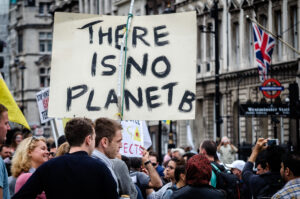News & Updates
The Case to Minimize Energy Consumption


For the last 15 years, Earth Hour, originally introduced by the World Wildlife Fund, has asked that everyone on Earth turn off the lights in their homes, businesses, and government buildings for an hour every year, from 8 to 9 PM on the last Saturday of March. On that day, global energy demand decreases by up to 4% as people around the world take part in standing up for our environment.
Earth Hour shows the power of citizen activism and our ability to create positive impacts with relatively small actions. Take part in Earth Hour – and then take steps to minimize your energy consumption the other 8,759 hours in a year to live more sustainably and reduce your carbon footprint.
Minimizing our energy consumption reduces the demand for energy and, as a result, the emissions of power plants. Energy production is responsible for harmful ecological effects at every stage of the process: the extraction of raw materials like coal and gas, the construction of power plants, the creation of electricity, and the eventual decommission of the facility.
Most power is generated by the combustion of non-renewable resources, such as coal and natural gas. During this process, contaminants are released into the air, nearby water sources, and the earth itself. The effects of power generation are felt long after the electricity reaches us, and the land where power plants sat become brown fields after they are no longer in use due to the amount of pollutants left behind.

In the U.S., power production is the second largest contributor of greenhouse gasses into the atmosphere. About 60% of our power is generated through the burning of fossil fuels. Solid waste produced by power plants, such as nuclear waste, ash, or contaminated water, is difficult to dispose of and has long lasting environmental consequences. Finally, electricity generation tends to have a disproportionate negative impact on disadvantaged groups and communities of color.
Zoning laws often put power plants close to underprivileged communities; the subsequent emissions and pollutants have negative health consequences for the health of nearby residents, such as higher rates of cancer and respiratory diseases. By reducing our electricity consumption, we can do our part to mitigate these dire consequences.
Leave No Trace is committed to minimizing the long-term consequences of people’s actions to ensure the sustainability and health of the planet, and reducing energy consumption is one of the most impactful steps you can take. Small changes to your everyday actions can make a big difference.
For example, switching to LED light bulbs is a relatively simple change. These bulbs use about 50 percent less electricity than traditional incandescent, fluorescent and halogen options. Turn off the lights when you aren’t in

the room and unplug appliances such as phone chargers when they aren’t in use. Washing your clothes in cold water not only reduces energy cost, but also extends your clothing’s life span. Increase your air conditioning or decrease your furnace by a few degrees.
All of these simple changes can drastically reduce your energy consumption. If you’re looking into larger, higher cost changes, you could also consider installing solar panels to offset the energy taken from power plants. Some cities and states have even started incentive programs to support solar panel installation, so learn what might be available in your area. Whether you make a small change or go big, you will be making a positive impact and living more sustainably.
Let’s protect and enjoy our natural world together
Get the latest in Leave No Trace eNews in your inbox so you can stay informed and involved.
